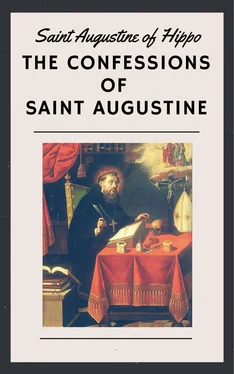When, then, we ask why a crime was done, we believe it not, unless it appear that there might have been some desire of obtaining some of those which we called lower goods, or a fear of losing them. For they are beautiful and comely; although compared with those higher and beatific goods, they be abject and low. A man hath murdered another; why? he loved his wife or his estate; or would rob for his own livelihood; or feared to lose some such things by him; or, wronged, was on fire to be revenged. Would any commit murder upon no cause, delighted simply in murdering? who would believe it? for as for that furious and savage man, of whom it is said that he was gratuitously evil and cruel, yet is the cause assigned; "lest" (saith he) "through idleness hand or heart should grow inactive." And to what end? that, through that practice of guilt, he might, having taken the city, attain to honours, empire, riches, and be freed from fear of the laws, and his embarrassments from domestic needs, and consciousness of villainies. So then, not even Catiline himself loved his own villainies, but something else, for whose sake he did them.
What then did wretched I so love in thee, thou theft of mine, thou deed of darkness, in that sixteenth year of my age? Lovely thou wert not, because thou wert theft. But art thou any thing, that thus I speak to thee? Fair were the pears we stole, because they were Thy creation, Thou fairest of all, Creator of all, Thou good God; God, the sovereign good and my true good. Fair were those pears, but not them did my wretched soul desire; for I had store of better, and those I gathered, only that I might steal. For, when gathered, I flung them away, my only feast therein being my own sin, which I was pleased to enjoy. For if aught of those pears came within my mouth, what sweetened it was the sin. And now, O Lord my God, I enquire what in that theft delighted me; and behold it hath no loveliness; I mean not such loveliness as in justice and wisdom; nor such as is in the mind and memory, and senses, and animal life of man; nor yet as the stars are glorious and beautiful in their orbs; or the earth, or sea, full of embryo-life, replacing by its birth that which decayeth; nay, nor even that false and shadowy beauty which belongeth to deceiving vices.
For so doth pride imitate exaltedness; whereas Thou alone art God exalted over all. Ambition, what seeks it, but honours and glory? whereas Thou alone art to be honoured above all, and glorious for evermore. The cruelty of the great would fain be feared; but who is to be feared but God alone, out of whose power what can be wrested or withdrawn? when, or where, or whither, or by whom? The tendernesses of the wanton would fain be counted love: yet is nothing more tender than Thy charity; nor is aught loved more healthfully than that Thy truth, bright and beautiful above all. Curiosity makes semblance of a desire of knowledge; whereas Thou supremely knowest all. Yea, ignorance and foolishness itself is cloaked under the name of simplicity and uninjuriousness; because nothing is found more single than Thee: and what less injurious, since they are his own works which injure the sinner? Yea, sloth would fain be at rest; but what stable rest besides the Lord? Luxury affects to be called plenty and abundance; but Thou art the fulness and never-failing plenteousness of incorruptible pleasures. Prodigality presents a shadow of liberality: but Thou art the most overflowing Giver of all good. Covetousness would possess many things; and Thou possessest all things. Envy disputes for excellency: what more excellent than Thou? Anger seeks revenge: who revenges more justly than Thou? Fear startles at things unwonted and sudden, which endangers things beloved, and takes forethought for their safety; but to Thee what unwonted or sudden, or who separateth from Thee what Thou lovest? Or where but with Thee is unshaken safety? Grief pines away for things lost, the delight of its desires; because it would have nothing taken from it, as nothing can from Thee.
Thus doth the soul commit fornication, when she turns from Thee, seeking without Thee, what she findeth not pure and untainted, till she returns to Thee. Thus all pervertedly imitate Thee, who remove far from Thee, and lift themselves up against Thee. But even by thus imitating Thee, they imply Thee to be the Creator of all nature; whence there is no place whither altogether to retire from Thee. What then did I love in that theft? and wherein did I even corruptly and pervertedly imitate my Lord? Did I wish even by stealth to do contrary to Thy law, because by power I could not, so that being a prisoner, I might mimic a maimed liberty by doing with impunity things unpermitted me, a darkened likeness of Thy Omnipotency? Behold, Thy servant, fleeing from his Lord, and obtaining a shadow. O rottenness, O monstrousness of life, and depth of death! could I like what I might not, only because I might not?
What shall I render unto the Lord, that, whilst my memory recalls these things, my soul is not affrighted at them? I will love Thee, O Lord, and thank Thee, and confess unto Thy name; because Thou hast forgiven me these so great and heinous deeds of mine. To Thy grace I ascribe it, and to Thy mercy, that Thou hast melted away my sins as it were ice. To Thy grace I ascribe also whatsoever I have not done of evil; for what might I not have done, who even loved a sin for its own sake? Yea, all I confess to have been forgiven me; both what evils I committed by my own wilfulness, and what by Thy guidance I committed not. What man is he, who, weighing his own infirmity, dares to ascribe his purity and innocency to his own strength; that so he should love Thee the less, as if he had less needed Thy mercy, whereby Thou remittest sins to those that turn to Thee? For whosoever, called by Thee, followed Thy voice, and avoided those things which he reads me recalling and confessing of myself, let him not scorn me, who being sick, was cured by that Physician, through whose aid it was that he was not, or rather was less, sick: and for this let him love Thee as much, yea and more; since by whom he sees me to have been recovered from such deep consumption of sin, by Him he sees himself to have been from the like consumption of sin preserved.
What fruit had I then (wretched man!) in those things, of the remembrance whereof I am now ashamed? Especially, in that theft which I loved for the theft's sake; and it too was nothing, and therefore the more miserable I, who loved it. Yet alone I had not done it: such was I then, I remember, alone I had never done it. I loved then in it also the company of the accomplices, with whom I did it? I did not then love nothing else but the theft, yea rather I did love nothing else; for that circumstance of the company was also nothing. What is, in truth? who can teach me, save He that enlighteneth my heart, and discovereth its dark corners? What is it which hath come into my mind to enquire, and discuss, and consider? For had I then loved the pears I stole, and wished to enjoy them, I might have done it alone, had the bare commission of the theft sufficed to attain my pleasure; nor needed I have inflamed the itching of my desires by the excitement of accomplices. But since my pleasure was not in those pears, it was in the offence itself, which the company of fellow-sinners occasioned.
What then was this feeling? For of a truth it was too foul: and woe was me, who had it. But yet what was it? Who can understand his errors? It was the sport, which as it were tickled our hearts, that we beguiled those who little thought what we were doing, and much disliked it. Why then was my delight of such sort that I did it not alone? Because none doth ordinarily laugh alone? ordinarily no one; yet laughter sometimes masters men alone and singly when no one whatever is with them, if anything very ludicrous presents itself to their senses or mind. Yet I had not done this alone; alone I had never done it. Behold my God, before Thee, the vivid remembrance of my soul; alone, I had never committed that theft wherein what I stole pleased me not, but that I stole; nor had it alone liked me to do it, nor had I done it. O friendship too unfriendly! thou incomprehensible inveigler of the soul, thou greediness to do mischief out of mirth and wantonness, thou thirst of others' loss, without lust of my own gain or revenge: but when it is said, "Let's go, let's do it," we are ashamed not to be shameless.
Читать дальше












